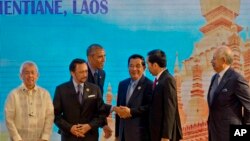During Barack Obama’s eight years as US president he left his mark across the world, including on Cambodia.
But while ordinary Cambodian people interviewed by VOA Khmer have expressed overwhelmingly positive views of his presidency, politicians and NGO leaders have had a more mixed reaction to the leader’s legacy.
Sok Eysan, a senior official and spokesman for the ruling Cambodian People’s Party, said Obama had an overall positive impact on Cambodia, noting that relations between the two countries improved under his administration, while his visit to the Southeast Asian country in 2012 for the ASEAN summit had left fond memories.
However, he criticized Obama for allegedly relying too heavily on reports from opposition parties and NGOs when assessing democracy and human rights issues, meaning that he “did not fully understand” what was happening.
Government spokesman Phay Siphan was more critical.
Siphan said Obama’s administration had more failures than achievements, as evidenced by the results of the US elections.
“He and his whole family, including the first lady, joined campaigns to support Hillary Clinton who was the presidential candidate, but still did not get support [from the people]. It was not [just] a personal failure of the presidential candidate, but a failure of the president who was still in power too,” he said.
Siphan added that Obama disappointed Cambodian people by not paying his respects to the body of former King Norodom Sihanouk during his visit to Cambodia in 2012.
But, he said, Obama did prove himself to be a leader of respectable character, who was capable of maintaining good foreign relations, including with Cambodia.
Son Chhay, a lawmaker with the opposition Cambodian National Rescue Party, said Obama’s election as the US’ first black president had brought hope to people across the world that regardless of race, they too could become a leader.
Chhay added that Obama’s administration had shown itself to be one of compromise rather than force in global affairs, and the leader had listened to the public when making crucial decisions.
However, he said, this method of compromise also had its downfalls.
“Cambodian people generally want to see the US play a more active role in pushing for freedom and social justice in the world, especially in Cambodia where suppression and human rights exploitation exist,” he said.
“We can see that under Obama’s administration, the US did not use its influence much to put pressure on the government to support the advocacy for democracy and human rights in Cambodia.
Ou Virak, founding president of the Future Forum think-tank, agreed that Obama’s “soft policy” had both positive and negative effects, as it ensured stability but allowed countries such as China and Russia to gain power.
While Obama’s attempts to build stronger relations with ASEAN countries was a positive political move, in Cambodia he had no major breakthroughs or conflicts with the government, he added.
When it came to environmental issues, Obama played a crucial role in releasing funds to countries such as Cambodia to protect natural resources, according to Chhit Sam Ath, country director for the World Wildlife Fund (WWF).
“It is important not only for one country, but for all countries in the world to protect and conserve natural resources to protect our planet, to prevent climate change, and to keep the environmental balance between the nature and humans,” he said, adding that Obama struck the right balance between managing economic, social and environmental issues.
Sam Ath said Obama’s character and vision should make him a role model for other leaders across the world.




